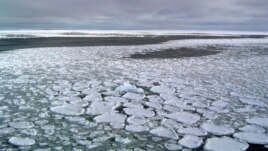26 September 2023
The U.S. National Snow and Ice Data Center (NSIDC) reported Monday that winter sea ice hit record lows in Antarctica this year.
Scientists say the lack of sea ice is evidence of serious climate change at the South Pole.
Researchers say the lack of sea ice will affect penguins, who mate and raise their young on the ice. In addition, a lack of ice speeds Earth's rising temperatures. A large amount of sea ice keeps the planet cool because it reflects sunlight back into space.

FILE - This January 2017 photo shows sea ice on the ocean surrounding Antarctica. (Ted Scambos/National Snow and Ice Data Center via AP)
The amount of sea ice was at its highest level on September 10, towards the end of the southern hemisphere's winter. However, it only covered 16.96 million square kilometers. That was the lowest coverage since satellite records began in 1979. The latest measurement breaks a low ice record from 1986 by about one million square kilometers.
Walt Meier is a top NSIDC scientist. "It's not just a record-breaking year," he said. "It's an extreme record-breaking year."
The group said the ice measurement findings are not complete. It said a full report would come out in October.
Sea ice reaches its peak, or highest level, in late September in the southern hemisphere. The ice melts to its lowest point during the hemisphere's summer in February or March.
The last summer measurement came about six months ago, which also set a new record for melting ice.
I'm Caty Weaver.
Dan Friedell adapted this story for Learning English based on a report by Reuters.
____________________________________________________
Words in This Story
reflect –n. to bend or throw back waves of light, sound, or heat